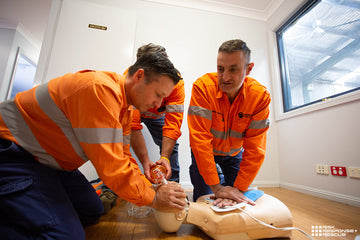Introduction
In today's busy and technology-driven world, the demand for specialized emergency training has never been much more important. Amongst these crucial trainings, the Low Voltage Saving (LVR) CPR course stands apart as a critical capability for professionals dealing with electric units. This short article delivers a comprehensive introduction of what you'll know in an LVR CPR course, outlining necessary skill-sets and also know-how that enable people to take action emphatically in emergencies involving uetdrmp007 perform rescue from a live low voltage panel low-voltage electric equipment.
What You'll Find out in an LVR CPR Course: Vital Capabilities for Emergency Situation Situations
Understanding Low Current Electrical Systems
Low voltage electrical bodies are ubiquitous in various industries, including building and construction, manufacturing, as well as telecoms. Understanding the operational attributes of these systems is actually basic for any person involved in similar industries.
Key Components:
- Definition of low voltage (normally listed below 1000V air conditioning or 1500V DC) Common apps of low current systems Safety criteria and guidelines regulating low voltage operations
The Importance of CPR Training
Cardiopulmonary Resuscitation (CPR) is actually a lifesaving method that can be essential in emergencies where someone's soul has quit or even they have ceased breathing.
Key Points:

- The stats responsible for cardiac arrests How fast application of CPR can easily increase survival rates The role of mouth-to-mouth resuscitation in work environment safety and security protocols
Combining CPR along with Low Current Saving Training
One of the distinct parts of the LVR CPR course is its assimilation of saving methods specific to electrical events along with typical mouth-to-mouth resuscitation training.
Benefits Include:
- Enhanced preparedness to respond to both cardiac emergency situations and also electrocution incidents. An in depth understanding of just how to properly move toward victims in online electrical situations.
Module Breakdown of the LVR CPR Course
Module 1: Overview to Reduced Voltage Rescue Procedures
In this module, participants find out about basic rescue procedures for low current incidents.
Topics Covered:
- Risk examination before conducting a rescue. Identifying threats connected with real-time LV panels.
Module 2: UETDRRF004 - Perform Rescue coming from an Online LV Panel
This unit focuses on practical skill-sets required for rescuing people from real-time low voltage panels.
Learning End results:
- Steps to securely isolate energy prior to executing a rescue. Techniques for safely taking out sufferers from harmful environments.
Module 3: Practical Application of Mouth-to-mouth Resuscitation Techniques
Participants participate in hands-on training treatments where they perform important CPR techniques.
Skills Developed:
- Chest compressions as well as saving breaths. Use of Automated External Defibrillators (AEDs).
Module 4: Urgent Response Protocols
Understanding when as well as how to intensify scenarios is critical. This element covers unexpected emergency response procedures details to power incidents.
Discussion Scores:
- When to call urgent services. How to educate onlookers effectively without inducing panic.
Real-Life Situations and Practice Drills
One cornerstone that makes the LVR CPR course effective is its own pay attention to real-life scenarios. Attendees are going to participate in substantial likeness physical exercises that simulate potential urgents they may face on-site.

The Role of Interaction In The Course Of Emergencies
Effective interaction can easily conserve lives throughout urgents. This segment focuses on approaches for very clear communication amidst chaos.
Important Methods Include:
- Using concise foreign language when driving bystanders. Ensuring very clear communication along with urgent responders upon their arrival.
Frequently Talked to Questions
1. What does UETDRRF004 entail?
UETDRRF004 refers specifically to the capability Click for more info device paid attention to performing rescues from live low voltage doors, showing essential skill-sets demanded for safe rescues.
2. Is actually accreditation given after completing the LVR course?
Yes, upon productive conclusion, individuals get qualification explaining they are actually trained in reduced voltage saving and mouth-to-mouth resuscitation techniques.

3. Can I find a 'CPR LVR course near me'?
Absolutely! Several instruction companies supply nearby courses; simply explore "CPR LVR courses near me" online to find options available in your area.
4. How long does the training take?
Typically, an LVR CPR course lasts between one day to two times relying on the service provider and also intensity of material covered.
5. Are there requirements for attending this training?
While there are actually commonly no stringent prerequisites, having basic first aid know-how may be beneficial just before joining this specialized training.
6. Why ought to I select UETDRMP007 over UETDRRF004?
Both units serve specific purposes; while UETDRMP007 concentrates a lot more generally on doing rescues from live reduced voltage panels, UETDRRF004 hones in primarily on useful skills required during those rescues.
Conclusion
The value of being readied can easily not be actually overstated when it concerns emergency scenarios entailing reduced current electric devices. Through enlisting in an LVR CPR course, you certainly not merely furnish yourself with life-saving capabilities however likewise prepare on your own psychologically and actually for unanticipated problems within your workplace or life. As our experts have actually checked out throughout this short article, what you'll know in an LVR CPR course incorporates a large variety of vital abilities that dramatically enhance your capacity to react efficiently in the course of unexpected emergencies-- creating it a smart investment into your individual security toolkit in addition to that of others around you.
Whether you are actually seeking professional certification or just desire to strengthen your data base relating to electric safety measures and emergency assistance feedbacks, working toward such training delivers very useful insights that sound much beyond preliminary knowing results-- it nurtures confidence and also preparedness where it matters most!